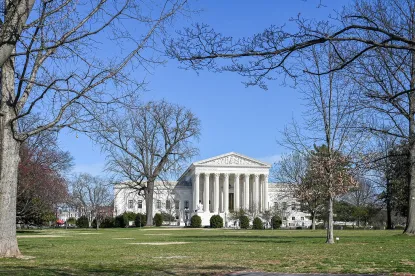In a per curiam opinion, the U.S. Supreme Court has dismissed the writ of certiorari granted in In re: Grand Jury, No. 21-1397, writing only that it was “improvidently granted.”
The Court heard oral argument on January 9, 2023, on the scope of protection from disclosure of certain communications between attorneys and clients.
The Court can dismiss any granted writ of certiorari as improvidently granted at any point before issuing a decision. It rarely provides reasoning for dismissing a granted writ. For example, here, the opinion was one sentence long: “The writ of certiorari is dismissed as improvidently granted.”
The Court granted certiorari in October 2022 to clarify the scope of attorney-client privilege in the context of dual-purpose communications. Circuit courts are split on the issue, with the U.S. Courts of Appeals for the Second, Fifth, Sixth, and Ninth Circuits defining the scope of privilege by the primary purpose of the communication (primary purpose test). The Court of Appeals for the D.C. Circuit defines the scope of privilege by determining whether one of the significant purposes of the communication was to obtain or provide legal advice (significant purpose test).
Perhaps foreshadowing the disposition of the case, Justice Elena Kagan asked counsel for the petitioner-law firm at oral argument to comment on “the ancient legal principle ‘if it ain’t broke, don’t fix it.’” Justice Sonia Sotomayor was similarly skeptical of the need to weigh in on the split, noting that courts are not struggling to apply the primary purpose test. On the other hand, the justices appeared to struggle to obtain clarity on the limits and contours of the significant purpose test.
Impact on Employers
The Court will not issue a decision in In re Grand Jury, leaving the split in the circuits as it stands.





 />i
/>i

